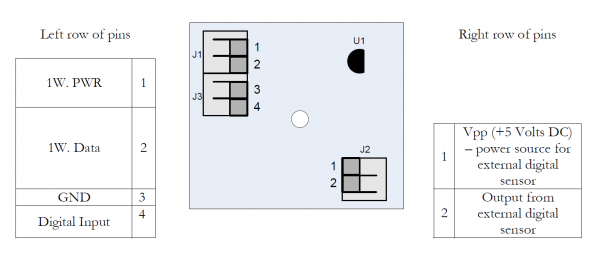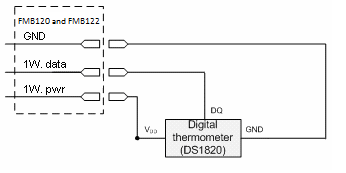TTJ Temperature sensor: Difference between revisions
No edit summary |
No edit summary |
||
| Line 23: | Line 23: | ||
''TTJ sensor pin-out and connection diagram:''<br/> | ''TTJ sensor pin-out and connection diagram:''<br/> | ||
[[File:TTJ connection scheme.PNG|none|600px|caption]] [[File:Sch fmb120 ds1820.png||none| | [[File:TTJ connection scheme.PNG|none|600px|caption]] [[File:Sch fmb120 ds1820.png||none|400px|caption]] | ||
'''Configuration''' <br/> | '''Configuration''' <br/> | ||
Revision as of 10:45, 29 April 2019
Main Page > Accessories > TTJ Temperature sensorOne of the implemented features for fleet management devices is 1-Wire data protocol, which enables connection of temperature sensors. It is a perfect accessory for temperature monitoring.
TTJ IS A SOLUTION FOR FLEET MANAGEMENT TRACKER IN FOLLOWING CASES:
- Thermostatic controls – maintain temperature near a desired set point.
- Thermally sensitive system – receive alerts when temperature enters or leaves pre-defined value.
- Consumer products – be assured that goods which you are delivering will maintain high quality.
Description
The TTJ Temperature sensor provides 9-bit Celsius temperature measurements and has an alarm function with nonvolatile user-programmable upper and lower trigger points. The TTJ communicates over a 1-Wire bus that by definition requires only one data line (and ground) for communication with a central microprocessor. It has an operating temperature range of –55°C to +125°C and is accurate to ±0,5°C over the range of –10°C to +85°C. In addition, the TTJ can derive power directly from the data line (“parasite power”), eliminating the need for an external power supply. Each TTJ has a unique 64-bit serial code, which allows multiple TTJ sensors to function on the same 1-Wire bus. Thus, it is simple to use one microprocessor to control many TTJs distributed over a large area. Applications that can benefit from this feature include HVAC environmental controls, temperature monitoring systems inside buildings, equipment, or machinery, and process monitoring and control systems.
TTJ technical characteristics
- Unique 1-Wire® Interface Requires Only One Port Pin for Communication
- Each Device has a Unique 64-Bit Serial Code Stored in an On-Board ROM
- Multidrop Capability Simplifies Distributed Temperature Sensing Applications
- Requires No External Components
- Can Be Powered From Data Line. Power Supply Range is 3.0V to 5.5V
- Measures Temperatures from -55°C to +125°C (-67°F to +257°F) ±0.5°C Accuracy from -10°C to +85°C
- 9-Bit Thermometer Resolution
- Converts Temperature in 750ms (max)
- User-Definable Nonvolatile (NV) AlarmSettings
- Alarm Search Command Identifies and Addresses Devices Whose Temperature is Outside Programmed Limits (Temperature Alarm Condition)
- Applications Include Thermostatic Controls, Industrial Systems, Consumer Products, Thermometers, or Any Thermally Sensitive System
TTJ sensor pin-out and connection diagram:


Configuration
On FMB unit, TTJ sensor parameters are configured as I/O element parameters: Dallas temperature and Dallas temperature ID.

The configuration procedure is as other I/O element (for example: FMB120_I/O_settings)
